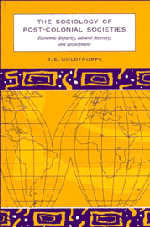Book contents
- Frontmatter
- Contents
- Preface and acknowledgements
- 1 Introduction and argument
- 2 Technology, society, and population
- 3 The colonial episode and the race question
- 4 Economic conditions
- 5 Environmental concerns
- 6 The social sciences and the ‘Third World’
- 7 The rise of towns
- 8 Family life in a changing world: two studies
- 9 Cultural diversity, language, education, and communications
- 10 Religion and development
- 11 Individual modernization: some psychological studies
- 12 Politics in post-colonial states
- 13 Aid and development
- Notes
- Index
3 - The colonial episode and the race question
Published online by Cambridge University Press: 03 May 2011
- Frontmatter
- Contents
- Preface and acknowledgements
- 1 Introduction and argument
- 2 Technology, society, and population
- 3 The colonial episode and the race question
- 4 Economic conditions
- 5 Environmental concerns
- 6 The social sciences and the ‘Third World’
- 7 The rise of towns
- 8 Family life in a changing world: two studies
- 9 Cultural diversity, language, education, and communications
- 10 Religion and development
- 11 Individual modernization: some psychological studies
- 12 Politics in post-colonial states
- 13 Aid and development
- Notes
- Index
Summary
Most of today's poor countries underwent at some time the experience of colonial rule. There were many variations of that experience, and it ended in some places before it had begun in others. Thus after the conquests that began around 1500 in the age of Columbus, the former Spanish colonies in South America became independent republics in the wars of 1810–26, while Portugal peacefully ceded Brazil's independence in 1822. British supremacy in India, established in fact by about 1805, was formally declared in 1858, and came to an end in 1947, while a number of other south Asian countries also became independent about that time. In Africa, although a few small coastal enclaves were established as early as the fifteenth century, in most of the interior the colonial experience was even later and even shorter. Partition among the European powers took place after 1880, and in many areas colonial administration was not effectively established until after 1900. Then, within a lifetime, there was a rush to independence around 1960, the so-called ‘year of Africa’.
Meanwhile, Russian expansion overland from the seventeenth century onwards brought the whole of north-eastern Asia under their control by the late eighteenth century. Russian colonization was then extended to Alaska and to enclaves on the north American Pacific coast as far south as California, till the United States purchased Alaska in 1867. Meanwhile, too, although the European states did not completely subjugate China, they asserted their power there during the nineteenth century when their nationals enjoyed extra-territorial rights and immunity from Chinese law, and territorial concessions created enclaves of foreign rule on Chinese soil.
- Type
- Chapter
- Information
- The Sociology of Post-Colonial SocietiesEconomic Disparity, Cultural Diversity and Development, pp. 45 - 71Publisher: Cambridge University PressPrint publication year: 1996



